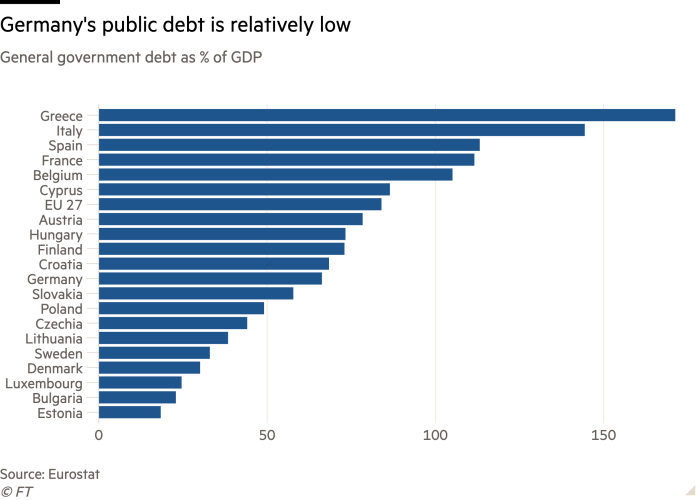[ad_1]
This article is an onsite version of our Europe Express newsletter. Sign up here to get the newsletter sent straight to your inbox every weekday and Saturday morning
Welcome back. Germany’s ruling coalition unveiled an economic reform plan on Tuesday aimed at stimulating investment, competitiveness and growth. How serious are the German economy’s difficulties? Is it fair or accurate to stick the label “sick man of Europe” on Germany for the second time in 25 years? I’m at tony.barber@ft.com.
First, the results of last week’s poll. Asked if the far-right Freedom party (FPÖ) would win Austria’s next parliamentary elections, 53 per cent of you said yes and 47 per cent said no. A close result — thanks for voting!
In the doldrums
Chancellor Olaf Scholz presented the German growth plan on the first day of a two-day government session at Schloss Meseberg, a palace outside Berlin. As the FT’s Guy Chazan reported:
The bill comes as concerns grow about the state of the German economy, which stagnated in the three months to June after shrinking in the previous two quarters, underperforming all its large rivals.
The IMF and OECD both expect Germany to be the world’s worst-performing leading economy this year.
Some early commentaries on the government’s initiative cast doubt on its likely effectiveness. Carsten Brzeski, global head of macro at ING bank and an experienced analyst of the German economy, estimated the total fiscal stimulus contained in the plan at about €8bn, or 0.2 per cent of annual national economic output. He wrote:
Today’s package will not be the big game-changer for the German economy . . . It shows that the government has finally become aware of the economy’s problems but it will probably require more and more concrete steps in the same direction to get the economy up to speed again.
‘Sick man of Europe’ 2.0?
It’s worth putting Carsten’s argument in historical context. The first time the phrase “sick man of Europe” was applied to Germany was in 1998.
At that time, the government and private sector businesses were not only battling to cover the stupendous costs of rebuilding former communist eastern Germany, reunified with the west in 1990. They also needed to regain competitiveness, reform labour markets and the welfare state, and dismantle the growth-choking shareholdings of banks and insurers in the corporate giants of German industry.
To its great credit, the Social Democrat-Green coalition led by Gerhard Schröder from 1998 to 2005 put Germany on the right path with a set of structural reforms culminating in an ambitious programme known as Agenda 2010. The government was so successful that by 2014 four economists published a paper in the Journal of Economic Perspectives with the title “From Sick Man of Europe to Economic Superstar: Germany’s Resurgent Economy”.
Ukraine war and other shocks
Are similar far-reaching measures required today?
There seemed something symbolic, as well as embarrassing, about the way German foreign minister Annalena Baerbock was forced to cancel a trip to Australia in August because of a faulty government aircraft. But of course the economy’s problems are wider than that.

In this very useful report for Deutsche Bank Research, Stefan Schneider lists six challenges facing Germany, some linked to Russia’s full-scale invasion of Ukraine 18 months ago and some longer term. They are:
-
The end of cheap Russian gas imports
-
China — an increasingly difficult market for German exporters and a potentially less reliable supplier than now of critical raw materials and technology
-
Germany’s need to invest in defence and security
-
Climate change
-
An ageing population and shrinking labour market
-
Excessive regulation and bureaucracy
However, Schneider says we shouldn’t ignore Germany’s strengths. Among these are relatively low public debt, which the Bundesbank estimated at 66.4 per cent of gross domestic product at the end of last year, low private sector debt and the quality of the debate in political and business circles about how to improve Germany as a Standort, or location for investment and innovation.

Above all, Schneider adds, Germany can count on its impressive Mittelstand, the midsized, often family-run companies that are famously known as the backbone of the economy. These are rarely household names, especially outside Germany, but they have an unmatched ability to win and keep large shares of world markets for the specialised products they make.
Mittelstand to the rescue
The same argument appears in this report, “The German economy: what is the problem?”, by Berenberg bank’s Holger Schmieding — who, incidentally, claims the title of being the first economist to use the term “sick man of Europe” back in 1998.
Schmieding contends that the doomsayers who say Germany is in deep trouble, because it relies too much on “old-fashioned” industries such as diesel cars and chemicals, are missing the point.
They are not the crucial factors that shape the German economy. Instead, the real drivers are the large numbers of often owner-led small- and medium-sized companies. Taken together, they comprise one of the best search engines for innovation ever invented.
Lack of reform under Merkel
However, Schmieding also makes a trenchant point about the aftermath of the 1998-2005 reform era. After Angela Merkel replaced Schröder as chancellor, eventually ruling for 16 years until she bowed out in 2021, “some policy complacency” set in.
For sure, she had to spend much of her chancellorship struggling to hold the eurozone together in the face of existential debt and banking sector crises. But in terms of domestic economic policy, Merkel failed to build on the Schröder era reforms and let things drift.
In some respects, she stored up problems for the future by insisting on rigid fiscal discipline — symbolised by the “debt brake” inserted in 2009 into Germany’s constitution. This had the effect of stifling much-needed public investment in infrastructure, digitalisation and other areas.
Lagging use of digital technologies
The IMF is among those emphasising the need to improve Germany’s internet connectivity. In its latest full-length report on the German economy, the Fund writes:
“While availability and subscriptions of fixed broadband are high in Germany, the speed of fixed broadband connection is slower than peers. High-speed internet is also less available outside large cities. Furthermore, use of digital technologies in business and digital skills is also lower compared to the EU average.”

Stepping off the debt brake
The IMF also politely suggests that the German authorities ought to consider modifying the debt brake rule. Now, it’s true that Germany “tore up its fiscal rule book”, as the FT puts it, by borrowing hundreds of billions of euros to deal with the Covid-19 pandemic and the energy crunch set off by Russia’s attack on Ukraine.
But finance minister Christian Lindner is itching to draw a line under this kind of expenditure. And under the debt brake rule, which is due to come back into force next year, there will be almost no room at all for taking on new debt.
The irony is that, as the IMF points out, Germany has in practice skirted round the debt brake by creating “multiple extrabudgetary funds totalling about 9 per cent of GDP” to pay for new climate action and defence initiatives.
It might make more sense to drop such “accounting trickery”, as The Economist magazine described it in a recent report on the German economy, and amend the debt brake rule. Then, everyone would have a clearer picture of what’s going on in the public finances.
Indisputably, some tough choices lie ahead. But let me conclude with two thoughts.
First, who would have predicted, 18 months ago, that Germany would wrench itself off its heavy reliance on Russian gas so quickly and decisively? It has caused much disruption to industry, but it has happened.
Second, the challenges of managing reunification and reforming the economy around the turn of the century were at least as formidable as anything Germany faces today. Germany dealt with those challenges.
There’s no reason, in principle, why it can’t do the same again — which would be good news for Europe.
Germany’s role in a geopolitically changed Europe: the thinking in Berlin — a report by Katarina Engberg of the Swedish Institute for European Policy Studies
Tony’s picks of the week
A “silent pandemic” of antimicrobial resistance threatens to kill millions of people every year, but governments, health systems and pharmaceutical companies are struggling to get on top of the problem, the FT’s Hannah Kuchler reports
The UN should make a new attempt at reviving negotiations aimed at reunifying the divided Mediterranean island of Cyprus after the last effort broke down in 2017, Maya Ungar and Nigar Göksel write for the International Crisis Group
Recommended newsletters for you
Are you enjoying Europe Express? Sign up here to have it delivered straight to your inbox every workday at 7am CET and on Saturdays at noon CET. Do tell us what you think, we love to hear from you: europe.express@ft.com. Keep up with the latest European stories @FT Europe
[ad_2]
Source link
